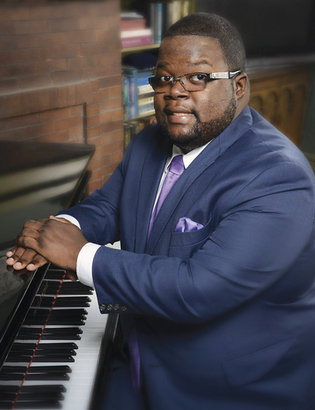
Courtesy Braxton Shelley
The Rev. Dr. Braxton Shelley, recently arrived at Yale, is the first tenured professor of Black gospel music at the university.
View full image
You may have heard the gospel song “In the Upper Room.” It looks simple on paper, and the melody is often sung very simply. But when I heard it performed live 35 years ago by the Black women’s singing group Sweet Honey in the Rock, it brought the house down. The soloist was a tall, slender woman, who kept her eyes closed and her head slightly lifted, and moved gradually from gentle, melodic prayer to an astoundingly powerful vocal ecstasy. By the end, the audience was cheering and euphoric. It was one of the best sung performances I’ve ever heard. (I bought several Sweet Honey in the Rock CDs after that, and I’ll never give them up.)
Of course, I’ve heard a lot of singing at Yale. When the future Yale University was founded in 1701, it was a school for aspiring ministers, who sang together frequently in church. The singing has continued since then, from the School of Music’s operas to the Alley Cats. What did surprise me recently, however, was learning that the Divinity School—which hired its first professor of theology in 1822—didn’t have a tenured professor of Black gospel music until 2021.
Two hundred and one years is a long time to wait. But the Rev. Dr. Braxton Shelley, who arrived at Yale in July, was both diplomatic and straightforward when I asked his opinion of the delay: “It’s just the case that all institutions of Yale’s vintage have a lot of work to do in the areas of diversity, equity, and inclusion. Gospel music is extraordinarily under-researched and underrepresented” in universities. Shelley has broken more than one boundary: he was also the first gospel expert on the faculty at Harvard. He came to Yale because of the Institute of Sacred Music, which he says is “without peer.” His official title: Associate Professor of Music, of Sacred Music, and of Divinity.
Shelley says he will likely offer one gospel course every year, open to a variety of students. He’s currently teaching students from Yale College as well as the Divinity School; one of his students this semester is a drama school student. “Gospel is this incredibly important American musical tradition with powerful influence on music all over the world,” he told me, “yet it has yet to receive the attention that has been trained on jazz and blues and rock.”
Black gospel music had its origins in African music, he noted. “What goes without question is that gospel music is part of a continuum of African American sacred expression that stretches across the centuries, that you see described in the earliest written descriptions of the musical and cultural practices of enslaved Africans.” Scholars debate where and when gospel music arose, but it’s clear that “in the ages of slavery, enslaved Africans built their own religious tradition . . . a faith that would grow into the Black church.”
His first book, Healing for the Soul (Oxford, 2021), explores the gospel songs of Richard Smallwood. (Shelley himself has been composing gospel songs of his own for the past decade or more.) It provides the kind of intricate musical analysis that helps one follow the progression from one chord, stave, or melody to another. And there’s more: “I try to get at this idea that I call the gospel imagination,” which he defines as “a kind of vernacular philosophy about what musical sound can do in terms of mediating the relationships between the material world and what’s called the spiritual realm.” He remembers attending a church music workshop at St. Paul Church of God in Christ, in Rocky Mount, North Carolina, when he was in elementary school. The singers performed Smallwood’s “Total Praise,” which begins with the lines “Lord, I will lift my eyes to the hills / Knowing my help is coming from You.” One moment especially still stands out to Shelley: the refrain, in which everyone sang, “You are the strength of my life.”
I asked him what his very first memory of gospel was. He said, “It’s always been with me. Forever.”
 loading
loading